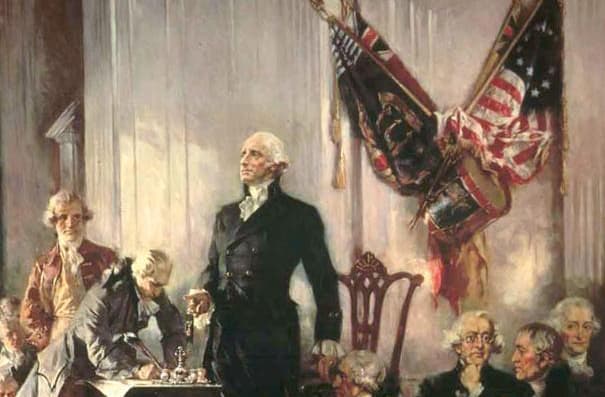George Washington: The First Businessman President
Washington believed wholeheartedly in a republic as the best form of government, but the subtext of that belief, it seems to me, is that a strong central government would be good for business.

‘George Washington and the Creation of the American Republic’
By William M. Fowler Jr.
Lyons Press, 296 Pages
After the American Revolution, George Washington wowed the world by returning to his pursuits as a farmer. No less than the king of England was impressed. Who had ever led troops into battle, won a war, fame, and acclaim, and then relinquished the power that was his to claim and hold?
No wonder Washington was hailed as a Cincinnatus, the only figure of antiquity who relinquished his supreme power in the early Roman republic for retirement to his farm. As William M. Fowler Jr. shows, Washington’s return to Mount Vernon was no pretense: He took an active part in managing his plantation, superintending every aspect of agriculture and the management of slaves. He knew all about crop rotation and the latest advances in tilling the land.
Between the end of the Revolution and 1789, when Washington became president, he spent much of his time on aggregating land investments and in quarrels with settlers who had moved onto property he claimed was his. He was a hard bargainer and kept demanding rent from the land’s occupants, who did not seem especially cowed by his august reputation. So Washington adapted to the give and take of frontier life, getting what he could out of recalcitrant pioneers.
Mr. Fowler might have made more of this aspect of Washington’s pre-presidential years. They seem to have prepared him perfectly for the dickering and acrimony of a Constitutional Convention, over which he presided after much coaxing and appeals to him as the one figure who could unite a nation.
The savvy Washington behaved like a Hollywood star, realizing it was better to be pursued than to be seen in pursuit of political office. To put it that way would have seemed vulgar to Washington, but I would have pointed out to him that not for nothing had he made a study of how heroes behaved on the stage. I would also have reminded him of that performance of “Cato” put on for his troops, a play by Joseph Addison about the republican hero opposed to the tyranny of Julius Caesar. Washington had committed much of the play to memory.
Mr. Fowler tends not to delve into such matters that reveal Washington’s psychology. Instead, we have a Washington who as a matter of policy held back his opinions, awaiting the accumulation of grievances against the ineffectual Articles of Confederation before he allowed himself to be importuned to return to command.
Unlike some of his Virginia contemporaries — Patrick Henry, for one — Washington did not distrust the establishment of a strong central government. The idea of a republic, a form of representative government, suited Washington because it did not rely on popularity contests but on the deep respect of the gentlemen landowners and professionals who would best stand for the interests of the whole nation.
The interests of a whole nation, by the way, may be why Lafayette, virtually Washington’s adopted son, got nowhere when it came to urging Washington to jettison slavery, even proposing they buy property and liberate slaves who would work for wages. Washington listened politely to Lafayette’s plan and then did nothing, concluding, it seems, it was neither in his interest nor in that of the new nation to make slavery a principal issue for debate.
When Lafayette visited Mount Vernon, he was careful not to press his adopted father on the fraught subject of slavery. What Mr. Fowler does not say is that Lafayette then turned to James Madison, hoping to get his consent to begin the process of manumission. Like Washington, however, Madison, while sympathetic to Lafayette’s arguments — wondering how the new nation that believed all men were created equal could enslave human beings — temporized. Now was not the time, he told Lafayette.
As Mr. Fowler tells it, Washington was the first businessman president and was not about to do anything that was not good for business, though Mr. Fowler never puts it that baldy. Washington believed wholeheartedly in a republic as the best form of government but, as Mr. Fowler shows, the subtext of that belief, it seems to me, is that a strong central government would be good for business.
Mr. Rollyson’s forthcoming book is “Making the American Presidency: How Biographers Shape History.”

